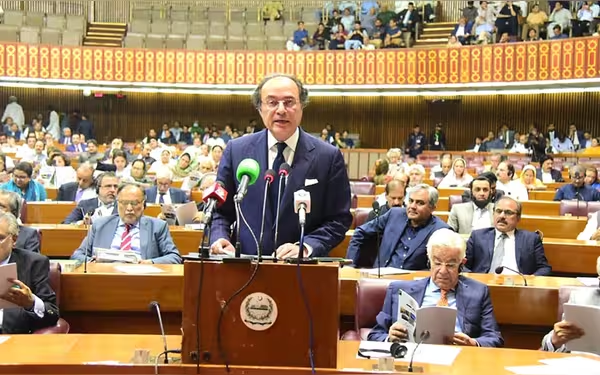Thursday, July 4, 2024 06:03 PM
Finance Minister Aurangzeb Unveils Pakistan's Fiscal Strategy
- Long-term IMF loan agreement to stabilize economy
- Forecasted GDP growth rate of 3.6%
- Tax reforms aligning with global standards
 Image Credits: dailytimes_pk
Image Credits: dailytimes_pkFinance Minister Aurangzeb outlines Pakistan's fiscal strategy for 2024-25, focusing on IMF agreements, GDP growth projections, tax reforms, and development sector allocations.
Finance Minister Muhammad Aurangzeb recently delivered the budget speech for the fiscal year 2024-25, shedding light on the economic challenges facing Pakistan and the strategies in place to tackle them.
Aurangzeb emphasized the significance of a long-term loan agreement with the IMF to stabilize the economy, despite the urgent need to alleviate inflation for the populace.
He praised the government's resilience in overcoming financial and political hurdles, stressing the necessity of bipartisan cooperation for economic progress. The minister also acknowledged the groundwork laid by the previous administration in securing the IMF agreement.
Looking ahead to the upcoming fiscal year, key economic projections were outlined, including a forecasted GDP growth rate of 3.6% and an anticipated inflation decrease to 12%. The budget deficit was capped at 6.9% of the GDP, with a primary surplus of 1%. Notably, ambitious tax collection targets were set, with a substantial rise expected for the Federal Board of Revenue.
The proposed budget allocated significant funds to the development sector, with a focus on existing projects and social welfare programs. Emphasizing equitable regional progress, funds were earmarked for diverse sectors like infrastructure, energy, and water resources.
The government's commitment to modernizing energy infrastructure, improving water resource management, and fostering sustainable development was underscored. Considerable investments were allocated for infrastructure enhancement, spanning energy, transportation, water, and housing sectors.
Tax reforms were also on the agenda, aiming to align personal tax rates with global standards. The minister suggested adjustments to tax slabs while retaining minimum and maximum rates, with a top tax rate of 45% for non-salaried individuals.
The budget speech for the fiscal year 2024-25 in Pakistan reflects a comprehensive approach to address economic challenges and foster sustainable growth. With a focus on IMF agreements, GDP growth projections, tax reforms, and strategic allocations in development sectors, the government aims to steer the economy towards stability and prosperity. The proposed measures signal a commitment to inclusive progress and financial prudence, setting the stage for a potentially brighter economic future for Pakistan.













